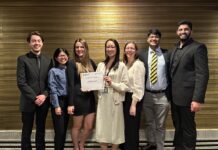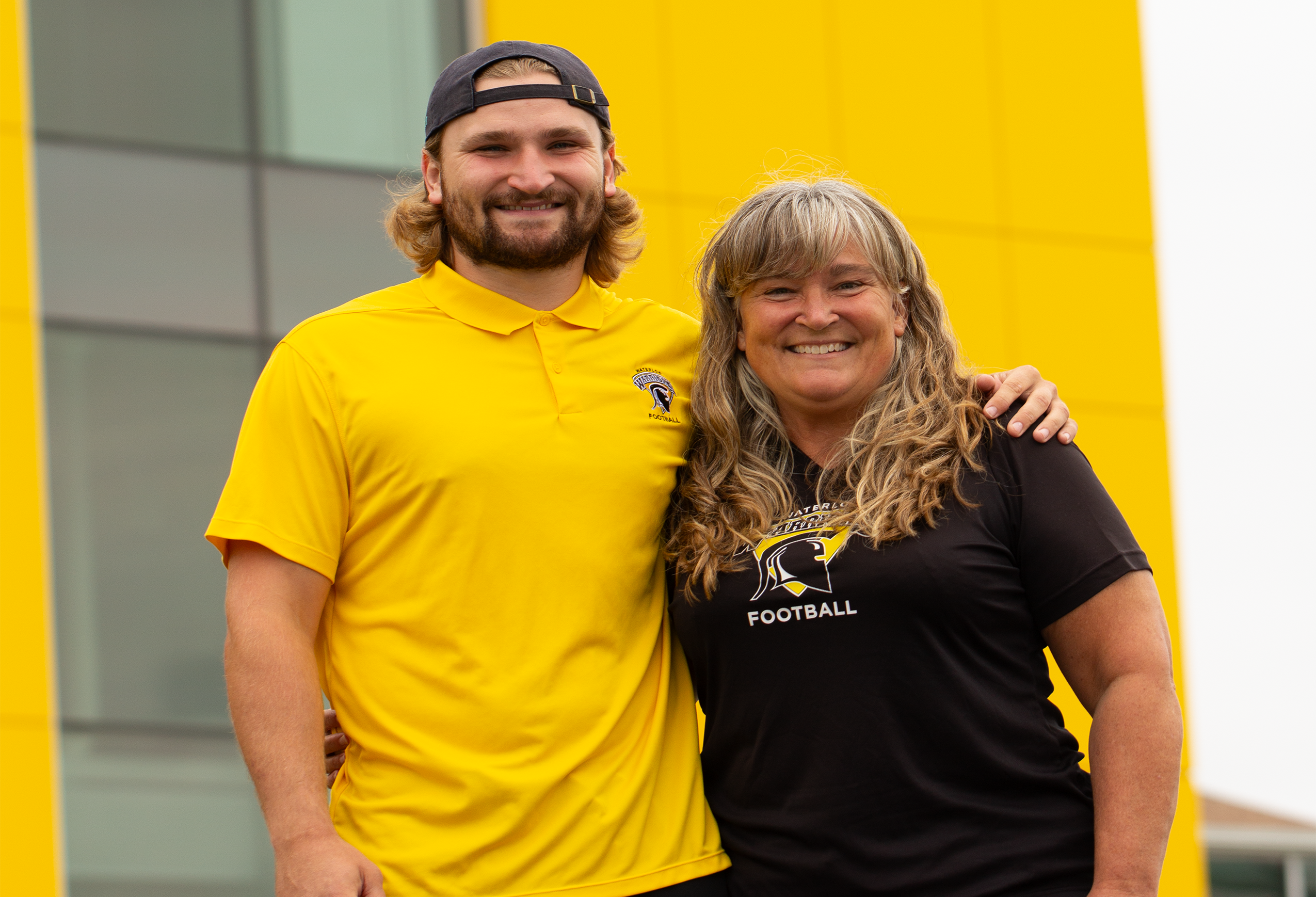By Riamarie Panachikal
By this point, you’ve undoubtedly walked into the Student Life Centre (SLC) at least once. This expansive building is home to a variety of essential services and the hub of our undergraduate student government — the Federation of Students.
At least once during your first year, you’ll probably pop by International News for a late night snack, stand in-line for a Go bus ticket at the Turnkey Desk, wait for hours to attend Bomber Wednesday, or pick up discounted textbooks from Feds Used Books. These services (and many more) are all facilitated by Feds.
From co-ordinators to executive directors and volunteers, Feds clubs and services functions because of the remarkable dedication of passionate students. If you have ever been interested in politics or social activism, the student government is a perfect spot to learn more about creating social change internally. Imprint sat down with the Feds executive team to help you learn a bit more about the massive campus organ that is Feds.
Meet your Feds executive team
Richard Wu, Feds President
Can you describe what your role is on campus for new undergrads?
Essentially [Feds] are here to help you solve problems and that can be pretty much anything. We provide a lot of services that have traditionally been student issues. For example: we helped negotiate the bus pass/ the U-Pass with the city; we provide twelve services for students … we provide the groundwork for many, many clubs on campus. Pretty much anything interesting that you can think of, there’s probably a club for it.
What are some Feds projects students should know about this year?
A: With specific reference to my portfolio, I’m working on what my predecessors started, in terms of sexual violence, response and prevention. I just went to a conference on Monday about a particular bystander prevention program which I think is incredibly useful. And we’re in talks with different departments in the university: the student success office, housing, we’re talking to Amanda Cook our sexual violence response coordinator to see where and how we could implement this, whether it should be through student leaders, whether it be through students directly. We’re still in talks with that and that’s one of my major projects this year.
I’d like to assist with student engagement and student mental health. That last one particularly is … something that’s always been on my mind and it’s something that I’ve wanted to help address at the university. I’m still looking into solutions for that. So far I’ve been sitting on a committee for student mental health, and that’s been incredibly fruitful … We’re going to be implementing the recommendations and I think it’s going to go really well.
Do you have any parting thoughts to share with first-years?
A: This is the time to ask questions, this is the time to make mistakes. This is the time to explore. I would say, do as much as you can. Obviously your schooling is the priority when you’re at the university, but I would say, take the time to do things that you’ve never done before. Maybe explore the city. Now is the time to figure out what you want. And getting involved is one really good way to make friends, to make lasting relationships, to build valuable skills. It’s incredibly useful and you definitely have a ton of opportunities at Feds.
Matthew Gerrits, Vice President of Education
Can you describe what your role is on campus for new undergrads?
My role is Vice President of Education. I am responsible for advocating for students both to the university and the government. Recently, I’ve just taken to breaking down my job into two main things, and that’s building relationships and using those relationships, to make sure that the policies that are brought in — either on the side of the university or on the side of the government — are good for students.
What is your goal for your position?
I’ve started recognizing that there’s been some internal stuff I want to be building within this department. I want to be making sure that our policy process is a little bit more robust. So we’re making sure we have research and consultations with students so that we can get good policies on the books and so that we can advocate for issues that students care about.
Another part of the job that will be big is dealing with the new provincial government. New governments mean new opportunities, new things to partner on, different priorities. And I’m looking forward to seeing where we could take that and how it could help students. Maybe not so useful for an Orientation Issue, but generally something I’m excited for.
What is something undergrads should do in their first year?
It’s not related to Feds at all, but I think people should explore the region. It’s something I kind of neglected to do. Use your Watcard to use GRT and get out to Kitchener and experience Kitchener. Go to St. Jacobs. There’s so much interesting stuff that goes on in Waterloo region and I really hope people take the chance to go and experience not only the great community in the university, but also the community beyond. If you want another piece of advice, volunteer. The Volunteer Centre here at Feds is a great opportunity for people to see the opportunities that are out there. And there are always organizations that are looking for people to help out.
What are the worst and best study tips you’ve heard?
Best study tip is use the Pomodoro technique, which is work for 20 minutes, then have a set five minute break and you come back and you space stuff out. That’s sort of the tip I find works for most people. The worst study tip is ‘due tomorrow, do tomorrow.’ It doesn’t work.
Kurt MacMillan, Vice President of Operations and Finance
Can you describe what your role is on campus for new undergrads?
With my role as Vice President of Finance I oversee the financial aspects. So for example, student fees that we pay towards Feds. I make sure that gets allocated properly throughout the organization, for example, for our clubs and services, for our staff, for our marketing. And then on top of that, with the operations side of it, so the commercial operations we have, for example: iNews, which is a 24 hour convenience store [and] the Bombshelter Pub, you know, a nice restaurant for everyone to hang out, get together, there’s bar night’s as well, or even for students to book events for their clubs; and also the Feds Used Bookstore for textbooks for students.
What sort of specific dilemmas can you assist students with?
Under my profile as well, the health and dental plan from student care. So if students need help with opting out, let’s say they already had insurance through their family’s coverage, or even opting in because they opted out, or there was a mistake in the school terms and they didn’t have coverage. I can help them out and get them back on to the plan. Another thing that falls under me is GRT. So, a lot of students lately, because of the new tap function on the WatCard for the buses, they’ve been having a lot of issues to get on. I’ve been dealing with GRT to try and create an opt-in option for the fall. I’ve created this grace period for students as well, so I try to help out with that and beginning of the term, it was just a lot of people wondering, ‘how can I get on the bus?’
What’s the strangest rumour you’ve heard about the UW campus?
The strangest rumour I’ve definitely heard and also the one I continue letting students know, it’s how Dana Porter is so filled with so many books that it’s sinking. That’s the rumour I was told in my first year, and I’ve been telling a bunch of people too. All the guys in the football team, when they say they need to study at DP, I was like, ‘Yeah, I’ve heard like it’s starting to sink because all the books until the tenth floor, the sugar cube is going down.’ So that’s definitely the strangest one I’ve heard. I don’t know if it’s true or not, but it was a fun one for my undergrad.
Savannah Richardson, Vice President of Social Life
What sort of dilemmas can you assist students with?
A lot of work I do is with student groups and how to engage with student groups. For example, in student societies, we do a lot of work on Waterloo needs, high priority areas and that’s [a lot of] the position. Really, I like to think that I like to listen, that student comes forward with a problem … They have this idea, but they really don’t know how to implement it, then I might help them, give them directions on, ‘hey you could look down this avenue, or this avenue.’
I think a big focus is that engagement is key to getting involved, and so, do you like to volunteer? There are part time opportunities at Feds, and so a lot of it is, ‘You want to start your own club? We can help you with that.’ I think we have so many clubs, but of course there are so many interests. And so, if that’s what you want to do, start new clubs, that’s awesome, get help with services.
What is your goal for this position?
Well there’s a few goals that I think I’m interested in covering. One of them is about student wellness. Recently we launched our wellness days in partnership with athletics and recreation and the health education program. We’re looking to prioritize wellness throughout the year and not just in a week of events or a couple ideas. I think one of my priorities is wellness and student wellness and how we can continue to improve student experience in that way… I’m really looking for opportunities to engage with our satellite campuses. Again, not exactly sure what that looks like right now, but that could be … bringing events to them, potentially bringing services to them depending of the needs of the students there.
We’re in the process of writing our action plans and so those will be released in the next couple of months for students to look over and to see where we’re guiding or trying to taking our year. But I think those are two of the major priorities on the list. As well, we will constantly advocate for student space and abilities for our clubs and services and societies to have space on campus to operate.
Why should students get involved with campus life clubs?
A: I’d say clubs is part of the campus life experience. But I think balance is really important. Doing what you love and what makes you happy is important. So, getting involved with campus life, it’s a great way to meet people. It’s a great way to, I think relax a little bit. I know that in any school, academics can be challenging. So, having the opportunity to take a step back and relax and do something you enjoy is really great. So, I’d say getting involved in campus life, whatever avenue you choose, is a great way to give yourself a break, I think.
What’s the strangest rumour you’ve heard about the UW campus?
I think the strangest rumour is that we don’t have fun, because I think we have lots of fun. I think it’s a very strange rumour that UW students don’t have fun because there are so many opportunities to have fun on campus [or] get involved, and there’s lots of events that are really fun, like the carnival at Welcome Week. That’s always a great time. There’s always smiling faces. I don’t know, to me smiles and fun are interrelated. So, when people say UWaterloo isn’t fun, I just like to show them how we have lots of fun. And so, I’d say that’s probably the strangest rumour. I think it’s the most common rumour, but I still think it’s strange.


































